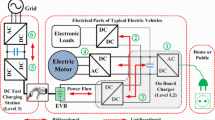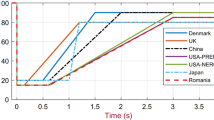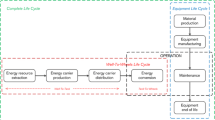Abstract
As the electrification of vehicles keeps being widespread, and facing the impossibility of storing big amounts of electrical energy, the challenge of controlling and adapting the electricity supply and demand has become a necessity. Therefore, electric vehicles could be an optimal solution for the storage and the retrieval of energy depending on the supply and demand of electricity. Thus, this study proposes an energetic strategy based on a multi-objective and multi-criteria optimization algorithm related to the control of the energy flows between the electric vehicles and the grid, home or building depending on the electricity supply and demand. The main focus at this stage involves the optimization of the vehicles’ charging mode. Hence, in this paper, the multi-objective optimization proposed is first implemented through the presentation of its algorithm and the description and modeling of its objective functions and their corresponding constraints. Then, the genetic algorithm optimization approach is adopted for the charging process of the study to find the optimal solution for each objective function. Besides, the weighted sum approach is applied after the normalization of all the fitness functions and several case studies are carried out to find the optimal solutions based on the priority of specific objectives over the others. Once all calculations are done, a simulation via Matlab software is performed and the results are discussed and compared. The simulation of the results has verified the theoretical calculations proving the effectiveness of the proposed methodology. However, as some of the calculated optimal solutions of the system seem to be conflicting, the prioritization of some objectives over others had to be operated in order to figure out a global solution for the multi-objective system. Thus, as a compromise had to be applied for the calculation of quasi-optimal solutions that would converge towards the Pareto-front, the decision maker’s preference would set the final solution using the weighted sum approach.

Similar content being viewed by others
References
Altiparmak, F., Gen, M., Lin, L., & Paksoy, T. (2006). A genetic algorithm approach for multi-objective optimization of supply chain networks. Computers & Industrial Engineering, 51, 196–215.
Apostolaki-Iosifidou, E., Codani, P., & Kempton, W. (2017). Measurement of power loss during electric vehicle charging and discharging. Energy, 127, 730–742.
Buerger, S., Lohmann, B., Merz, M., Vogel-Heuser, B., & Hallmannsegger, M. (2010). Multi-objective optimization of hybrid electric vehicle considering fuel consumption and dynamic performance. In IEEE vehicle power and propulsion conference, Lille (pp. 1–6).
Carr, J. (2014). An introduction to genetic algorithms. Senior Project, 1(40), 7.
Clement-Nyns, K., Haesen, E., & Driesen, J. (2012). The impact of charging plug-in hybrid electric vehicles on a residential distribution grid. IEEE Transactions on Power Systems, 25(1), 371–380.
Coello, C. A., Lamont, G. B., & Van Veldhuizen, D. A. (2007). Evolutionary algorithms for solving multi-objective problems. Genetic and evolutionary computation (Vol. 5, pp. 79–104). New York: Springer.
Deilami, S., Masoum, A. S., Moses, P. S., & Masoum, M. A. S. (2011). Real-time coordination of plug-in electric vehicle charging in smart grids to minimize power losses and improve voltage profile. IEEE Transactions on Smart Grid, 2(3), 456–467.
Gaudin, C., Krotova, M., & Guerlais, L. (2011). Distribution network applications and recomendations for 2020 EV infrastructure charge development in France. In CIRED 21st international conference on electricity distribution.
Guo, D., & Zhou, C. (2016). Potential performance analysis and future trend prediction of electric vehicle with V2G/V2H/V2B capability. AIMS Energy, 4(2), 331–346.
Guzzella, L., & Sciaretta, A. (2007). Vehicle propulsion systems (Vol. 1). Berlin, Heidelberg: Springer.
Hamidi, A., Nazarpour, D., & Golshannavaz, S. (2017). Multi-objective scheduling of microgrids to harvest higher photovoltaic energy. IEEE Transactions on Industrial Informatics, PP(99), 1.
Joshi, R. P., & Deshmukh, A. P. (2006). Hybrid electric vehicles: The next generation automobile revolution. In IEEE electric and hybrid vehicles (pp. 1–6).
Kahraman, R., & Sunar, M. (2001). A comparative study of multiobjective optimization methods in structural design. Turkish Journal of Engineering and Environmental Sciences, 25, 69–78.
Kim, I., & De Weck, O. (2005). Adaptive weighted sum method for biobjective optimization. Structural and Multidisciplinary Optimization, 29(2), 149–158.
Kisacikoglu, M., Erden, F., & Erdogan, N. (2017). Distributed control of PEV charging based on energy demand forecast. IEEE Transactions on Industrial Informatics, PP(99), 1.
Konak, A., Coit, D., & Smith, A. (2006). Multi-objective optimization using genetic algorithms: A tutorial. Reliability Engineering and System Safety, 91, 992–1007.
Malhotra, R., Singh, N., & Singh, Y. (2011). Genetic algorithms: concepts, design for optimization of process controllers, computer and information. Science, 4(2), 39.
Marler, R. T. (2004). Survey of multi-objective optimization methods for engineering. Structural and Multidisciplinary Optimization, 26, 369–395.
Marler, R. T., & Arora, J. S. (2010). The weighted sum method for multi-objective optimization: New insights. Structural and Multidisciplinary Optimization, 41(6), 853–862.
Mausser, H., Ding, Y., Gregov, S., Grodzevich, O., Halevy, I., Kavazovic, Z., et al., (2006). Normalization and other topics in multi-objective optimization. In Proceedings of the fields–MITACS industrial problems workshop, Toronto, Ontario.
McCall, J. (2005). Genetic algorithms for modelling and optimization. Journal of Computational and Applied Mathematics, 184, 205–222.
Mkahl, R., Nait-Sidi-Moh, A., Gaber, J., & Wack, M. (2017). An optimal solution for charging management of electric vehicles fleets. Journal of Electric Power Systems Research, 146, 177–188.
Rojas, R. (1996). Genetic algorithms, neural networks. Berlin: Springer.
Shi, J., Liu, Z., Tang, L., & Xiong, J. (2017). Multi-objective optimization for a closed-loop network design problem using an improved genetic algorithm. Applied Mathematical Modelling, 45, 14–30.
Stanimirovic, I., Lj, M., & Zlatanovic, M. Petkovic. (2011). On the linear weighted sum method for multi-objective optimization. Facta Universitatis, Series: Mathematics and Informatics, 26, 49–63.
Xu, N., & Chung, C. (2015). Reliability evaluation of distribution systems including vehicle-to-home and vehicle-to-grid. IEEE Transactions on Power Systems, 31, 759–768.
Xu, L., Mueller, C. D., Li, J., Ouyang, M., & Hu, Z. (2015). Multi-objective component sizing based on optimal energy management strategy of fuel cell electric vehicles. Applied Energy, 157(2015), 664–674.
Yao, W., Zhao, J., Wen, F., Dong, Z., Xue, Y., Xu, Y., et al. (2014). A multi-objective collaborative planning strategy for integrated power distribution and electric vehicle charging systems. IEEE Transactions on Power Systems, 29(4), 1811–1821.
Zakariazadeh, A., Jadid, S., & Siano, P. (2013). Multi-objective scheduling of electric vehicles in smart distribution system. Energy Conversion and Management, 79(2014), 43–53.
Author information
Authors and Affiliations
Corresponding author
Additional information
Publisher's Note
Springer Nature remains neutral with regard to jurisdictional claims in published maps and institutional affiliations.
Rights and permissions
About this article
Cite this article
Merhy, G., Nait-Sidi-Moh, A. & Moubayed, N. A multi-objective optimization of electric vehicles energy flows: the charging process. Ann Oper Res 296, 315–333 (2021). https://doi.org/10.1007/s10479-020-03529-4
Published:
Issue Date:
DOI: https://doi.org/10.1007/s10479-020-03529-4




